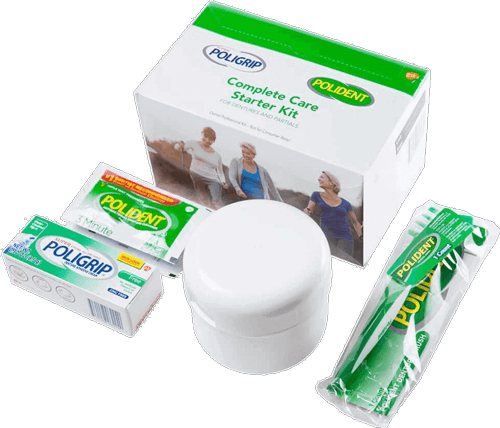
How to Get Used to Wearing New Dentures
Dentures and partial dentures are great options for people who are looking for a replacement solution for their missing or decayed teeth. They can allow you to eat better and experience confidence and an improved smile. The transition does take time for you to feel secure and function with dentures as you did with your natural teeth. Until then, you may experience slight discomfort when eating and speaking. So, how long does it take to get used to new dentures? What about partials? How to get used to partial dentures? Let’s discuss these common concerns that many new denture wearers have and how to get used to dentures.
How Long Does It Take to Get Used to Dentures?
Using dentures doesn’t just involve chewing and speaking. How to get used to new dentures involves a new way of thinking that you’ve never experienced before. Here are a few tips that can help you learn how to get used to dentures quickly and easily:
Wear Your Dentures
It sounds simple enough. But many people get dentures and then give up, falsely believing that there is no effort required to learn to use them. Dentures are a foreign object and they evoke an unnatural feeling of fullness. They also stimulate the salivary glands to overproduce saliva when you first begin to wear dentures. Nothing makes getting used to new dentures harder than not wearing them all day, every day. Wearing your dentures consistently will help your mouth adapt more quickly to the feel of the dentures.
Make a Knife and Fork Your Two Best Friends
Cutting food into smaller than normal pieces is a great way to introduce yourself to chewing with dentures. Dentures take up extra space in your mouth, making it more difficult to break down big pieces of food. Simply cutting the food into more manageable bites will make the task that the dentures must handle much easier and more effective.
Dental Visits
How to get used to new dentures and being committed to wearing your dentures doesn’t mean enduring discomfort or pain. If your dentures are hurting or cutting into your gum tissue, they can make your life miserable. There is no reason to suffer. Visit your dentist right away to have your dentures adjusted. It’s amazing the relief that you will experience after a minor adjustment.
Practice Speaking as if Rehearsing for a Speech
The quickest way to learn how to get used to new dentures and to become accustomed to speaking with them is to practice in private every day until you are able to master speaking clearly without thinking. Slowly read aloud from a book or article in front of a mirror, retraining your tongue to form the sounds that are naturally difficult to pronounce. With practice, using your dentures will become second nature. See the companion article “Prepare for Dentures: The Denture Process Start to Finish” for additional tips about how to get used to new dentures.
Allow Your Mouth to Rest
Above all, don’t get in the habit of wearing dentures 24/7. Your muscles need the opportunity to rest. The tissues that make up your mouth need to be exposed to the air in order to remain healthy and free from bacterial or fungal overgrowth. Make sure to clean your dentures every day using a denture cleanser and a soft-bristled denture brush. Remove your dentures before sleeping in order to clean them thoroughly and allow them to soak overnight.
How Long Does It Take for Dentures to Feel Normal?
For most people, it takes anywhere from 2–4 weeks or longer to function reasonably well with new dentures. How to get used to new dentures starts with a “can do” mindset. If you remember that getting dentures is a process that involves a learning curve in order to use them, it will make the transition to wearing them much easier and more enjoyable.
Common Problems with New Dentures
You may experience some problems when you first wear dentures. Those issues may include:
- Soreness of the oral and facial muscles
- Soreness along the gums, especially if teeth were extracted
- Increased salivation
- A sensation that dentures move around in your mouth
These issues surrounding how to get used to new dentures will resolve with time as your muscles and nerves become accustomed to working with the foreign appliance in your mouth. Much like a prosthetic leg, your body must become comfortable with using artificial teeth in order to control and manage them efficiently and effectively.
Tools for Making Dentures More Comfortable
Aside from cutting foods into smaller pieces, there are other things that you can do to make your dentures more comfortable when eating.
- Avoid chewing sticky or hard foods such as caramels and hard candies
- Chew slowly and bite more carefully to avoid catching the soft tissue
- Consume softer foods in the beginning before advancing to more difficult-to-chew foods
- Distribute the food evenly and chew using the teeth on both sides of your mouth
- Don’t attempt to bite with the front teeth; Doing so often dislodges the denture
Getting Used to Wearing Dentures
Proper oral care is important for how to get used to new dentures and for denture longevity. Here are some tips for better oral care:
- Brush your tongue, the roof of your mouth, and your gums before bed and also before you put your dentures back in your mouth after sleeping.
- Eat a nutritious, balanced diet full of vitamins and nutrients consisting of fresh fruits and vegetables.
- If you have no natural teeth, you still need to visit your dentist regularly in order for your gums to be examined and to check the fit and condition of your dentures. Minor denture problems can often be solved before they become a major issue with regular checkups.
- How to get used to partial dentures also involves proper maintenance of your existing teeth. You must follow a regular dental hygiene schedule in order to keep your gums and remaining teeth in tip-top condition so that your partial will continue to serve you for many years to come.
Frequently Asked Questions
Will denture pads or adhesives help me get used to dentures more quickly?
Adhesives are intended to improve denture security as a temporary measure when dentures no longer fit as well as they once did. Relying on these products in the beginning is a crutch that may prevent you from getting used to wearing your new dentures comfortably. Bottom line — avoid using these products. Return to your dental professional if you continue to experience denture problems that don’t resolve within a few days.
I have friends who wear dentures and they can eat and speak with ease. Why can’t I?
It’s likely that they went through the same issues that you are experiencing as a new denture wearer. Experienced denture wearers have mastered how to use their dentures. Any new endeavor takes time to learn the necessary skills to make it seem second nature. With time, practice, patience, and confidence, you, too, will become the master of your dentures.
I know people who wear their dentures all the time. Is this a bad thing?
It is. Would you wear your shoes 24/7? Imagine the condition of your feet if you did. The skin would remain damp and bacteria and fungus would take over causing sore, inflamed, and painfully chapped skin. The same idea applies to dentures. The tissue inside of your mouth needs time to be exposed to the air. Both your dentures and the tissues in your mouth need to be cleaned every day to avoid the buildup of germs that lead to a toxic environment which can cause sores and affect your overall health.
How long does it take to get used to upper dentures?
In most instances, upper dentures take less time to become accustomed to wearing because they gain suction which helps them stay in place. Lower dentures rely on gravity for security and often feel notoriously loose. In addition, it takes lower denture wearers time to retrain their tongue to rest in such a way that it can actually help hold the denture in place.



